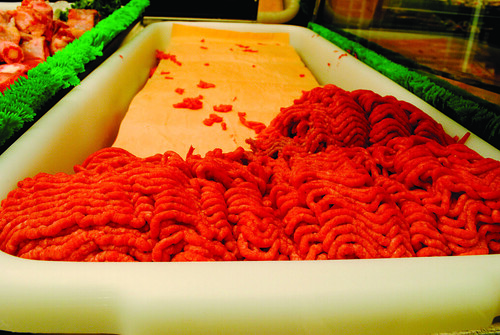Columnist Sarah Sanders dissects some dinner-time favorites and looks at all the pesticides and eco-detrimental factors of each table dressing.
As my column’s title implies, I usually use this image of the dinner table as a figurative place where only appropriate things can be discussed. It’s a safe zone, a harmonious haven, where the American family can bond over its hearty meal. Of course, I suggest this image ironically as I hash out contemporary topics of disgust and discomfort.

Today, however, I will not be employing this irony because what I’m about to address directly involves the dinner table. One thing will stay the same: I still plan to ruin your appetite.
As college students, our supper meals may have transformed from what we had gotten used to when we lived with our parents or whomever used to take care of us. I may have been itching to vacate my hometown in search of a bigger, busier city. But in retrospect, I’m not sure I relished the luxury of being a dependent as much as I should have.
My favorite meal was this dish where my mom fried chicken and broccoli in a creamy cheese sauce and served it over rice. The chicken was OK, but I really dug the broccoli and cheese together. At the time, I trusted anything my mom put on my plate, and so did she. Why on earth would the grocery store sell food that could harm its customers?
Well, the grocery store is only part of this meal’s story. Sure, my mom bought all the ingredients there, but they were delivered from various food production companies. The cheese was probably Velveeta – not really cheese but rather a “processed cheese food” loaded up with enough salt that it can sit on a shelf, in room temperature, for a while without going bad.
Although I’m not sure where the chicken came from, I can guarantee you it was not a happy chicken when it was alive. She probably lived in a very crowded, windowless hen house that smelled like chicken poop. The farmer, most likely employed by a huge poultry industry, pumped her with hormones so she would grow twice as fast, leaving her so large her legs probably snapped under the pressure every time she tried to walk. So before I was even old enough to have pubic hair, I was already ingesting hormones through my food.
And this isn’t coming from an animal-rights advocate perspective, although that shouldn’t really change the credibility of the argument. Rather, I’m saying my food was never healthy, even when it was alive. Even the broccoli was tainted with loads of pesticides that have never been tested on humans. The same concoctions you spray at the cockroaches that invade your apartment in Fishtown probably end up on your apple skins and lettuce leaves. Albeit the pesticide residue on your Dole banana is small, the hundreds of women working in these food production facilities in Costa Rica are being exposed to exponentially larger amounts of these chemicals, suffering infertility and birth deformities in their children.
Unfortunately, I would contend that the college lifestyle has increased our collective ingestion of man-made chemicals that could be very harmful to us later in life. All the ingredients in your Doritos, Skittles, Pepsi, et cetera, that some don’t even bother to read are not disappearing just because you ignore them. They go right into your system and wear down your body because they’re unnatural additives.
And most of them are various derivatives of corn. Sure there are 19 different slushy combinations at 7-Eleven, but they all have one major ingredient in common: high fructose corn syrup. This industry has become huge – to the point that corn is all you see as you pass through Ohio, Indiana, Illinois, Iowa and on to the Midwest. Scientists have mastered techniques of manipulating corn DNA so that it can grow robustly even in inclement weather conditions.
I would never hesitate to say that we are a guinea-pig generation that has been volunteered to test this frankenfood for the benefit of the corporations that produce it. As a result, we face higher numbers of obesity, diabetes, heart disease and cancer than ever before.
As I only have a small space in this newspaper to write, I implore you to investigate the issues I have mentioned for yourself. The food on your plate at suppertime is more loaded than you know. And I won’t apologize for corrupting your idyllic image of food; as I discussed at the beginning, I’m here to make you uncomfortable.
Sarah Sanders can be reached at sarah.sanders@temple.edu.



Be the first to comment